News & Stories
2019
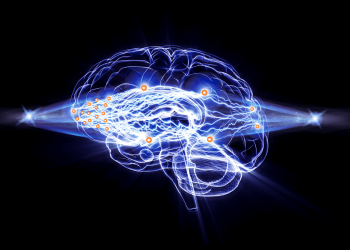
News
HKUST Researchers Build the World’s First All-Optical Multilayer Neural Network Paving Way for Next Generation of AI Hardware
Researchers from The Hong Kong University of Science and Technology (HKUST) have developed the world’s first all-optical neural network for deep machine learning – bringing artificial intelligence a step closer to matching human brains in tackling complex problems such as pattern recognition or risk management, and at much lower energy consumption at the speed of light.
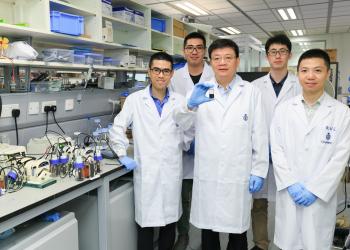
News
HKUST-led Research Successfully Develops Rechargeable Liquid Fuels to Power Electric Vehicles and Electricity Grid
A cross-university research project led by The Hong Kong University of Science and Technology (HKUST) has successfully developed an environment-friendly rechargeable liquid fuel that promises to have impact on a global scale. It can fully recharge an electric vehicle in a matter of minutes – a great enhancement from existing battery technology which usually takes hours.
This fuel – called ‘e-fuel’ – is carbon-neutral if charged with solar or wind energy. Like fossil fuels, it can be readily dispatched to the power grid, and also rapidly recharged to vehicles.
The research, titled ‘Creation of Rechargeable Electron-fuels for Stationary Power Supplies and Electric Vehicles’, is led by Prof. ZHAO Tianshou of HKUST and supported by academics from The University of Hong Kong, The Chinese University of Hong Kong, and The Hong Kong Polytechnic University.
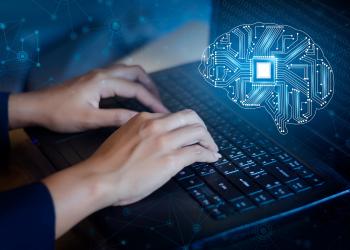
News
Let's Play it Smart on Computer Interfaces
Brain-machine interface - or the technology to synergize the brain with an external device so the latter can carry out orders, has been frequently featured in sci-fi movies as futuristic fantasy.
Instead of maneuvering with our fingertips, individuals connected to such devices can transmit their thoughts, and the machines would do their bidding like magic.
Recently, an American start-up promised to make this scenario a reality.
A small chip would be surgically inserted into one's brain, which is then connected to a receiver with or without a wire, allowing the user to control things like a mouse or a keyboard.
The company is even aiming to make the implant surgery equivalent to a simple surgical procedure like LASIK where one can walk away within hours.
While this sounds revolutionary for people with disabilities, is the general public ready to sign up for its service?
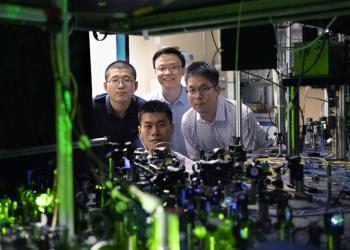
News
HKUST-led Research Team Unveils Groundbreaking Quantum Simulation of 3D Topological Matter with Ultracold Atoms
Complex topological matter (peculiar materials with different bulk and surface properties) has become the focus of both industrial and academic research because it is seen as a way to eventually make quantum computing more noise-free and robust. Today’s physical quantum computers are still noisy, and the protection of fragile quantum information against noises is a growing field of research. The goal of fault-tolerant quantum computing is to maintain its functionality in the presence of noise, which has driven investment into complex topological matter.
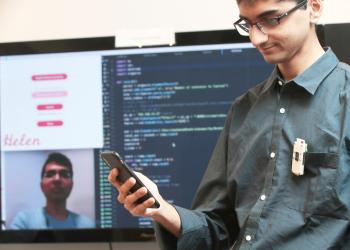
News
Read My Lips: AI for Hearing Aids
Padmanabhan KRISHNAMURTHY (Paddy)’s sister worked with an NGO in India that helps people with visual impairment. He observed that people with any kind of impairments face immense difficulties, and wanted to do something to alleviate their problems. This inspired him and his teammate Amrutavarsh Sanganabasappa KINAGI (Amrut) to invent a lip-reader named “Helen”, which has just won the top prize in the 2019 HKUST President’s Cup that encourages undergraduate students to showcase creativity, innovation, and excellence.
Named after Helen KELLER, the renowned American author and educator who overcame the adversity of being blind and deaf to become one of the 20th century's leading humanitarians, the lip-reading device is expected to benefit millions of people when it’s well developed. According to the World Health Organization, there are 466 million people globally with some form of disabling hearing loss, and this number is forecasted to grow up to 900 million by 2050.
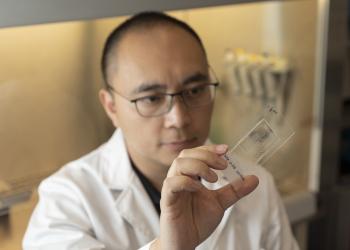
News
Baby Steps, Big Dreams
In Hong Kong, 1 in 6 couples struggles to get pregnant, compared to 1 in 10 two decades ago. In China, the infertility rate has risen to 12-15% from just 2.5% in the early 1990s. Many couples have begun to seek medical help to fulfil their desire to have a baby – there are 50 million patients with fertility problems in China. Listening to Dr. SHU Yiwei Ervin, current student of MPhil Program in Technology Leadership and Entrepreneurship (TLE) offered by the Division of Integrative Systems and Design of HKUST's School of Engineering, talk about the pain involved in the in-vitro fertilization (IVF) process, and his hope that his startup can eventually increase the success rate of the procedure, is both moving and inspiring.
News
HKUST Researchers Co-Discover a Novel Function of an Enzyme Offering Insight Into the Pathology of Hereditary Spastic Paraplegia
Researchers of the Hong Kong University of Science and Technology (HKUST) and Institute of Biophysics, Chinese Academy of Science recently identified that an enzyme called atlastin (ATL) is used to regulate the transportation of proteins within cells. This novel finding offers new insights into the pathology of Hereditary Spastic Paraplegia – a rare inherited disorder with symptoms of lower limb spasticity accompanied by possible neurological deficiencies.

News
Time to Smell the Roses in Race of Life
Humans are creatures who often judge whether a dish is attractive or a stranger is friendly simply by their own eyes. But our sense of smell is just as important.
We all may have the experience of eating with a stuffy nose and found a dish to be tasteless or using our nose to check whether it has gone bad.
Moreover, people tend to keep their distance from a person with an unpleasant odor, while special odors like gas can alert us to dangers of a leak.
As the old Chinese adage goes, "My shack is better than an emperor's bed."
What makes our own shack better?
Our smell, together with the smell of our family members, and pets as well if any, makes it unique and reassuring.
To understand how smell impacts people, researchers at the University of British Columbia, Canada, invited 96 couples for a study last year.






